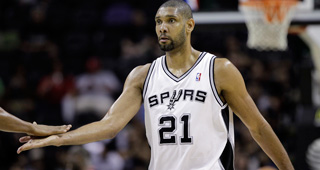Tim Duncan isn’t the greatest player in NBA history and certainly not the most entertaining or culturally relevant, but no team has extracted more value from a player and for longer than the Spurs did with him since Bill Russell and the Celtics. The Spurs filched Duncan when a 59-win team suddenly won just 20 with David Robinson missing 76 games in 96-97 due to injury. San Antonio won the lottery, drafted Duncan, moved Gregg Popovich permanently down from the front office to the bench and they were set.
Duncan was the last great four-year college player and was NBA ready from the first time he stepped onto an NBA floor on Halloween night in Denver in 1997, putting up a 15 and 10 with two blocks and two assists in an 11-point Spurs’ win. Duncan was ready for the NBA and the Spurs had a playoff roster ready for him, which was an equally important part of the quick start. Duncan had a later beginning to his career but he outlasted everyone, spending 19 seasons with the Spurs, winning titles in Year 2, Year 6, Year 8, Year 10 and Year 17.
There was no pseudo-retirement to play baseball like Michael Jordan. There was no loan deal to Miami and then back like LeBron James. There was no trade demand from Milwaukee to L.A. or New York like Kareem Abdul-Jabbar. There was no HIV or a bad back to preempt his career like Magic Johnson and Larry Bird. There was never a lack of commitment to his craft or free agency departure like Shaquille O’Neal. There was no real developmental process as a young player or multi-year retirement decline while dominating cap space like Kobe Bryant.
Duncan was the greatest all-around big man of all-time. Duncan couldn’t dominate offensively quite like Shaq, Wilt Chamberlain and Kareem but he was better than all three on defense, while he was far better on offense than Bill Russell. Duncan would impose his will on offense but he was unstoppable and would get his points within the flow of the Spurs’ offense that went through him during most of his career. Duncan’s rim protection was constant and the Spurs always had one of the NBA’s best defenses.
Duncan very nearly left the Spurs for the Magic in 2000, which would have allowed him to leave an aging roster to play with pre-injuries Grant Hill, who was then the best all-around wing in the NBA. Duncan stayed and the Spurs rebuilt their team multiple times, first with Tony Parker, Manu Ginobili and Bruce Bowen in the middle third and then Kawhi Leonard, Tiago Splitter, Danny Green and LaMarcus Aldridge near the end.
Duncan made nearly a quarter of a billion in career earnings but he took substantially less money over his final four seasons to help the Spurs maximize their roster around him. This was despite losing more than $20 million due to fraud from his financial advisor and a contentious divorce in 2013.
Duncan came into the NBA as an All-Star and MVP candidate with a PER of 22.6 and it didn't finally dip below 20.0 in Year 19 when he could no longer had quite enough physically to score like he even could during his previous few seasons. But Duncan still led the NBA in Defensive Real Plus Minus in his final NBA season. Duncan surely could have squeezed in a 20th year and it appears he would have if Kevin Durant agreed to sign with the Spurs with how the initial leaning towards retirement report was time, but he instead goes out not necessarily on top but as a still excellent version of himself.
Duncan won his second and final regular season MVP in 2003 after going back-to-back and his last Finals MVP in 2005, but the final third of his career is perhaps more interesting. Duncan remained miraculously healthy and the credit for that goes to Duncan’s freak genetics, commitment to his body and the Spurs taking the long-view on rest.
It began in 2000 when Duncan tore his meniscus at the end of the regular season and the Spurs decided to not risk further injury despite trying to defend their title. Duncan played in all 82 games in the next two seasons and 81 in the third as he went on his MVP run. Duncan played in 40.6 minutes and 39.3 minutes per game in those two MVP seasons before dropping him down to the low thirties by 04-05 in what is now the model for all of the smart teams. The legacy of injury prevention developed by Popovich with Duncan will perhaps be their greatest gift to the game as more of the all-time greats extend their careers at a high level into their late thirties.
Popovich certainly needed Duncan more than Duncan needed Popovich, but they were perfectly suited for each other to form a partnership that embossed the NBA over 19 seasons. The Spurs eschewed regular season win totals and treated it like a laboratory to become the best version of themselves in time for the playoffs. Duncan’s game evolved as much as the Spurs depending on what was needed and was the foundation for their unprecedentedly sustained success.



